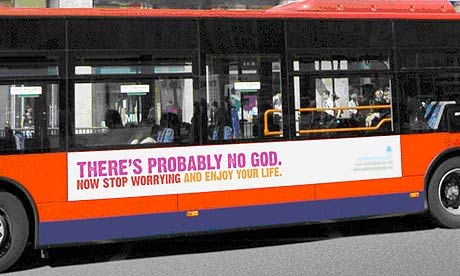Bus Ride to Nowhere
By Krishna Dharma Dasa | Feb 14, 2009

Travelers battling through the Westminster traffic this month are likely to encounter a bleak message emblazoned on buses. “There’s probably no God. Now stop worrying and enjoy life,” is the dubious legend plastered to a number of the vehicles meandering around the nation’s capital. I’m not sure how its authors think we should respond to this call. Should we breathe a sigh of relief and immediately rush off to engage in all sorts of licentious behaviour so long denied us by a killjoy God? That sounds worrying to me, I have to say. Such so-called enjoyment is inevitably indulged in at considerable cost to the world, to others and ultimately to our own selves. Intoxication, illicit sex, stealing, gambling, killing and other such sins generally vetoed by religion are not pursuits we should lightly unleash on the world at large.
What do the proponents of this message mean by ‘God’ anyway? As we know the term is variously interpreted, but if we assume they mean a supreme controller and judge of our acts, then just how probable is his non-existence? It is not very probable that there is no power moving us in ways we cannot prevent. Even scientists, and it was a prominent one who funded the bus campaign, spend their time trying to find and understand the laws of the universe. Laws. Those things that cannot be changed or contravened, which uphold our existence and which obviously must have an upholder. Laws mean a lawmaker, and no matter how proud we may become of our learning and progress, we can never claim to have made any universal laws.
As for a judge, well we have to ask why, despite our best efforts to avoid it, we suffer? All our work aims at one end, to enjoy life and be happy. In accordance with our best understanding of cause and effect we work in ways calculated to produce desirable results, but we often reap a rather a different harvest. So why is that? Honest thought should conclude that we are doing something wrong; that we have not yet properly understood the universal laws and are therefore transgressing them, to our cost.
That does not mean there must be a stern God sitting somewhere in judgment, waiting for us to sin so he can rain down pestilence and death upon us. I can quite understand people wanting to get away from that kind of fierce deity. But as in any state or country, there are laws and consequences that will ensue if we break them. We need those laws. The Vedas say that in the absence of law and order, enforced by good government, then the ‘law of the fish’ will soon prevail. The bigger fish will swallow the smaller one. Honest citizens are therefore happy to see the rule of law in place. It is only criminals who revel in a lawless state.
The message on the bus could well have said, “There is no government. Now go out and party.” But honesty must again intervene to point out that if there is no government the party will soon be over. Governments don’t only enforce law and punish offenders; they also administer and manage the state, keeping things going smoothly (we hope), so we have food, shelter, money and everything else we require if we are to live happily.
Surely then there must be a universal government maintaining the cosmos and providing our necessities. The sun draws water from the ocean, which then goes up to the sky, over the land and rains down on our fields; and we eat. A wonderful system, and one over which we have no control, along with all such perfect universal arrangements. To date no scientist has been able to manufacture even one seed, never mind a sun.
Who is the fool who will suggest that there is no intelligence behind all these intricate universal systems; and that they go on by chance? Day after day they continue working. If chance brought them into being, and if chance is truly supreme and there is no controller, then we should expect no predictability. Everything should run wild with random occurrences popping up everywhere without rhyme or reason. But as we all know that is probably not going to happen. Again, the very point of science is to fathom out the rhymes and reasons behind nature, so we can predict the outcome of our endeavors with some certainty.
But how well are we doing that? Which brings me back to my point above. There is a higher power, let’s call it God, determining the consequences of our work. We are obliged to accept those results and no slogan on any bus can change that. Our best hope is to accept the very high probability of God’s existence, try to properly understand his desires, and then carry them out to the best of our ability. Only then will we truly stop worrying and enjoy life.















